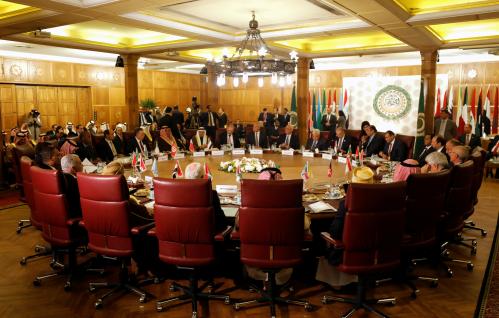The passing of top Palestinian official Saeb Erekat is a sad and consequential moment for all those who worked to advance a just peace between Israel and the Palestinians over the past three decades. It comes at a time when the Palestinians find themselves at a difficult juncture. Today, the goal that Erekat pursued for all of his political career — a sovereign Palestinian state in the West Bank and Gaza with East Jerusalem as its capital, living at peace with Israel — is further away than it has been at any time since the 1993 Oslo Accords.
For those who knew him, Erekat was a brilliant and a driven defender of Palestinian rights. And contrary to his public image — partly born of his authoritative manner of speech — he was a humble man, aiming to serve his people as best he could.
Growing up in Jericho, in the same house he inhabited during his final days, he traveled to the U.S. to earn degrees from San Francisco State University, and to the United Kingdom where he earned a doctorate from Bradford University. He worked his way up to become a professor at Al-Najah University, where his ideas, prolific writings, and public commentaries were noticed beyond the West Bank and Israel. The first Intifada, the Palestinian uprising that began in 1987, propelled him into politics, and he ultimately rose to become chief Palestinian negotiator. His 1988 passionate, eloquent advocacy of Palestinian rights on ABC’s Nightline — together with another Palestinian luminary, Hanan Ashrawi — brought him to the attention of a much larger audience in the United States and beyond.
Saeb was a loyal friend of the Brookings Institution and participated in numerous events over the years, working closely with the scholars focused on Israeli-Palestinian issues. He was also generous to my home institution, the University of Maryland, as he always found time for substantive meetings with our university and state delegations under challenging circumstances.
Erekat of course was not a politician who depended on broad public support, even as he became an important part of the leadership. He was ultimately highly dependent on the president of the Palestinian Authority (PA), in recent years Mahmoud Abbas. And his principal portfolio was negotiations with Israel and foreign affairs, not internal Palestinian affairs. As such, it was hard to know how he would have performed if he were a principal decisionmaker.
For example, Erekat advocated democracy among Palestinians and regionally, and criticized those who argued that Islam or Arab culture were somehow incompatible with democracy. Those of us who knew him also knew his feelings were genuine. But Palestinians have not had national elections since 2006. Abbas himself was elected in 2005, and parliamentary elections — which Hamas won — were held a year later. After that, a series of events and decisions led to the break between Hamas and the PA, a break that has been used as a reason for not holding elections since. New elections are now planned within the next six months, but with no guarantee the plans will come to fruition.
Given his key role in interacting with outside powers, Saeb will be missed abroad as well as at home. He cultivated relationships with many world leaders, and had a notable ability to communicate the Palestinian positions effectively. Sure, Palestinian leaders have to shoulder some of the responsibility for failure to advance national goals, and Erekat was part of that leadership. But the truth is that the sheer challenge of advancing a just peace between Israel and the Palestinians, the insurmountable power disparity between them, and the stance of right-wing governments in Israel (a stance incompatible with the minimum acceptable outcome to Palestinians) all ensured that even the most effective leaders that Palestinians could imagine would have likely fallen short.
Responsibility aside, it was painful for a man who spearheaded Palestinian negotiations to watch in his last months the Trump administration’s complete embrace of the Israeli right’s agenda, ignoring international law and Palestinian rights. In recent weeks, he also witnessed peace deals between Israel and two Arab states, the United Arab Emirates and Bahrain, bypassing the Palestinians. Those deals also highlighted shortcomings of the Palestinians’ own diplomacy in the Arab world, whose support they have always assumed. But he was heartened that the global — and American — human rights communities have grown to be more sympathetic with the Palestinians, and more aware of their humiliating occupation. This he has sought throughout his career.
Erekat was a caring, talented man who loved his people, passionately defended Palestinian rights, and accepted the idea of peaceful co-existence with Israel in the context of “two states for two people.” He was relentless in this pursuit, even as he faced serious health issues, including lung transplants in 2017. For decades, he worked hard to advance Palestinian-American relations, but, like most Palestinians, found it impossible to work with a Trump administration that ignored the basic rights of his people.
Even before Erekat’s passing, Palestinians were already thinking ahead, as 84-year-old Abbas has been facing his own health challenges. Erekat will be missed, and his passing will accelerate the conversation about what comes next.








Commentary
Saeb Erekat: A tireless advocate for the Palestinian people
November 10, 2020